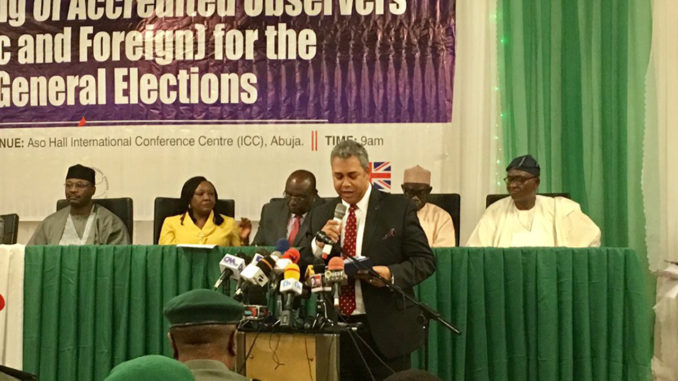
There is increasing intentional attention on Nigeria’s general elections, a matter of days away.
Given the seeming desperation of political players, there are fears locally and internationally that things could go wrong if politicians throw caution to the winds.
For this reason, the pre-emptive notes of warning to politicians to eschew violence or face international sanctions by the United States, United Kingdom and the European Union are intelligible.
The apparent message is that if the elections are faulty, not free and fair and marred by widespread violence, they will wield the big stick in the form of a regime of sanctions comprising visa ban on culprits and their families, and asset freeze among other punitive measures.
Since the seeming triumph of liberal internationalism as a result of the collapse of the Soviet Union and the consequent end of bipolarity, the spread of liberal democracy across the globe has been upbeat and the pay-off has been the evolution of a democratic axis around the United States and its Western European allies.
Regional organisations ranging from the Commonwealth to European Union have all fashioned tools and protocols of diplomacy on democracy.
It is the convention that for nations to belong to the democratic club, their process of leadership recruitment must be based on democratic norms.
Since democracy is the exercise of popular sovereignty, the process must be seen to be free and fair, unencumbered by meddlesomeness of state institutions to earn the badge of legitimacy.
For nearly three decades of post-bipolarity, western governments and institutions have made election observation and monitoring key elements of their foreign policies.
Beyond condemnation and exhortational statements, they have not hesitated to wield the big stick in terms of sanctions when governments and institutions of state are found wanting in ensuring free and fair elections.
Since 1999 when Nigeria’s fourth republic was birthed, the country has played host to sundry election observation and monitoring team.
Besides, the country has received generous funds from democracy promotion countries and grant-making bodies to improve the electoral process and deepen democratisation. Often they have tried to give unbiased scorecard on electoral processes.
For example, in 2007 general elections, the Commonwealth observer mission to Nigeria passed a damning verdict on the election to the extent of noting that Nigeria went below the standard, it set for itself.
So, much of the improvement in election administration by the electoral management body, the Independent National Electoral Commission (INEC), was as a result of that very report.
Indeed, the government in power was compelled to set up the Justice Uwais Panel, which recommended a number of measures to improve election administration in Nigeria.
Therefore, election observation and monitoring have claim to value. It has increasingly attained the status of a universal practice.
It is gratifying to acknowledge the interest international community has shown so far towards the peaceful conduct of the 2019 elections in our country, nudging for a fair field of play so that the votes of Nigerians may count.
In particular, the U.S. has stressed their engagement with the electoral process in the country, “paying close attention to actions of individuals who interfere in the democratic process or instigate violence against the civilian population before, during and after the elections.”
Although the Nigerian government ostensibly welcomes observers and monitors, it has displaced some hysteria over what it calls interference in the process.
Of course, the U.S. has assured that they are not in our country to choose for us but to ensure that the citizens are not hindered from exercising their franchise on February 16 and March 2, 2019.
However, recent developments in the polity, coming from the executive arm of government have been worrisome for many keen observers of the Nigerian political scene.
The presidency refused to accede to the Electoral Act Amendment Bill, which would have revised the order of election and ensured full deployment of technology without grey areas.
The presidency also carried out a curiously whimsical suspension of the Chief Justice of Nigeria a few weeks to elections; and the controversial deployment of INEC personnel in ways that are aggrandizing to the executive arm of government.
These curiosities too have expectedly attracted the attention of our development partners and indeed the international community.
Thus, the statements by the U.S. and the UK among others become pertinent if only to remind the politicians not to go beyond acceptable norms.
The U.S. said its interest lay in supporting Nigeria’s democratic process and ensuring free and fair elections.
It stressed further that the U.S. government would not shy away from imposing sanctions on actors and institutions that seek to undermine the democratic process in Nigeria.
The UK on its part is prepared always to help grow the democratic process in our country.
The local effort at compacting peace agreement between the contending politicians/social forces and the possible arrival of U.S. former president Bill Clinton in Nigeria go further to underline the importance of peace, thereby establishing the importance of diplomacy of democracy in volatile and ethnically diverse country like ours.
This is not the time to ignore the observers and monitors but rather we should cooperate with them to have free and fair elections.
Lest we forget, the incumbent president had praised the significance of the same diplomatic intervention, which enabled the peaceful conduct of 2015 elections the opposition party, (now governing party) won.
Need we remind ourselves, that Nigeria even in the dark days of military dictatorship performed somewhat democracy promotion roles in conflict-ridden countries of Liberia and Sierra Leone?
Therefore, we should gracefully accept this civilised act of election observation and monitoring without threats of ‘body bags’ by some overzealous and careless political leaders.
In the main, intervention, not interference of the international community has become an edifying democratic norm.
END

Be the first to comment